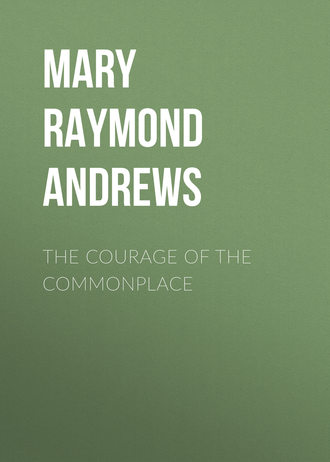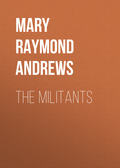
Mary Raymond Shipman Andrews
The Courage of the Commonplace
"Wait, my dear," he said. "There's a ray of hope. Not really hope, you know—it was certain death he went to—but yet they haven't found—they don't know, absolutely, that he's dead."
Five minutes later the girl was locked in her room with the paper. His name was in large letters in the head-lines. She read the account over many times, with painstaking effort to understand that this meant Johnny McLean. That he was down there now, while she breathed pure air. Many times she read it, dazed. Suddenly she flashed to the window and threw it open and beat on the stone sill and dragged her hands across it. Then in a turn she felt this to be worse than useless and dropped on her knees and found out what prayer is. She read the paper again, then, and faced things.
It was the oft-repeated, incredible story of men so accustomed to danger that they throw away their lives in sheer carelessness. A fire down in the third level, five hundred feet underground; delay in putting it out; shifting of responsibility of one to another, mistakes and stupidity; then the sudden discovering that they were all but cut off; the panic and the crowding for the shaft, and scenes of terror and selfishness and heroism down in the darkness and smothering smoke.
The newspaper story told how McLean, the young superintendent, had come running down the street, bare-headed, with his light, great pace of an athlete. How, just as he got there, the cage of six men, which had gone to the third level, had been drawn up after vague, wild signalling, filled with six corpses. How, when the crowd had seen that he meant to go down, a storm of appeal had broken that he should not throw his life away; how the very women whose husbands and sons were below had clung to him. Then the paper told of how he had turned at the mouth of the shaft—the girl could see him standing there tall and broad, with the light on his boyish blond head. He had snatched a paper from his pocket and waved it at arm's-length so that everyone could see. The map of the mine. Gallery 57, on the second level, where the men now below had been working, was close to gallery 9, entered from the other shaft a quarter of a mile away. The two galleries did not communicate, but only six feet of earth divided them. The men might chop through to 9 and reach the other shaft and be saved. But the men did not know it. He explained shortly that he must get to them and tell them. He would go to the second level and with an oxygen helmet would reach possible air before he was caught. Quickly, with an unhesitating decision, he talked, and his buoyancy put courage in to the stricken crowd. With that a woman's voice lifted.
"Don't go—don't ye go, darlin'," it screamed. "'Tis no frinds down there. 'Tis Terence O'Hara and his gang—'tis the strike-makers. Don't be throwin' away your sweet young life for thim."
The boy laughed. "That's all right. Terence has a right to his chance." He went on rapidly. "I want five volunteers—quick. A one-man chance isn't enough to take help. Quick—five."
And twenty men pushed to the boy to follow him into hell. Swiftly he picked five; they put on the heavy oxygen helmets; there was a deep silence as the six stepped into the cage and McLean rang the bell that signaled the engineer to let them down. That was all. They were the last rescuers to go down, and the cage had been drawn up empty. That was all, the newspaper said. The girl read it. All! And his father racing across the continent, to stand with the shawled women at the head of the shaft. And she, in the far-off city, going though the motions of living.
The papers told of the crowds gathering, of the Red Cross, of the experts come to consider the situation, of the line of patient women, with shawls over their heads, waiting always, there at the first gray light, there when night fell; the girl, gasping at her window, would have given years of her life to have stood with those women. The second day she read that they had closed the mouth of the shaft; it was considered that the one chance for life below lay in smothering the flames. When the girl read that, a madness came on her. The shawled women felt that same madness; if the inspectors and the company officials had insisted they could not have kept the mine closed long—the people would have opened it by force; it was felt unendurable to seal their men below; the shaft was unsealed in twenty-four hours. But the smoke came out, and then the watchers realized that a wall of flame was worse than a wall of planks and sand, and the shaft was closed again.
For days there was no news; then the first fruitless descent; then men went down and brought up heavy shapes rolled in canvas and bore them to the women; and "each morning the Red Cross president, lifting the curtain of the car where he slept, would see at first light the still rows of those muffled figures waiting in the hopeless daybreak." Not yet had the body of the young superintendent been found; yet one might not hope because of that. But when one afternoon the head-lines of the papers blazed with a huge "Rescued," she could not read it, and she knew that she had hoped.
It was true. Eighteen men had been brought up alive, and Johnny McLean was one. Johnny McLean carried out senseless, with an arm broken, with a gash in his forehead done by a falling beam as he crawled to hail the rescuers—but Johnny McLean alive. He was very ill, yet the girl had not a minute's doubt that he would get well.
And while he lay unconscious, the papers of the country rang with the story of what he had done, and his father sitting by his bed read it, through unashamed tears, but Johnny took no interest. Breathing satisfied him pretty well for a while. There is no need to tell over what the papers told—how he had taken the leadership of the demoralized band; how when he found them cut off from the escape which he had planned he had set them to work building a barrier across a passage where the air was fresher; how behind this barrier they had lived for six days, by the faith and courage of Johnny McLean. How he had kept them busy playing games, telling stories; had taught them music and put heart into them to sing glees, down in their tomb; how he had stood guard over the pitiful supply of water which dripped from
the rock walls, and found ways of saving every drop and made each man take his turn; how when Tom Steele went mad and tried to break out of the barrier on the fifth day, it was McLean who fought him and kept him from the act which would have let in the black damp to kill all of them; how it was the fall in the slippery darkness of that struggle which had broken his arm. The eighteen told the story, but by bit, as the men grew strong enough to talk, and the record rounded out, of life and reason saved by a boy who had risen out of the gray of commonplace into the red light of heroism. The men who came out of that burial spoke afterward of McLean as of an inspired being.
At all events the strike question was settled in that week below, and Johnny McLean held the ringleaders now in the hollow of his hand. Terence O'Hara opened his eyes and delivered a dictum two hours after he was carried home. "Tell thim byes," he growled in weak jerks, "that if any wan of thim says shtrike till that McLean child drops the hat, they'll fight—O'Hara."
Day after day, while the country was in an uproar of enthusiasm, Johnny lay unconscious, breathing, and doing no more. And large engineering affairs were allowed to go and rack and ruin while Henry McLean watched his son.
On a hot morning such as comes in May, a veteran fly of the year before buzzed about the dim window of the sick-room and banged against the half-closed shutters. Half-conscious of the sound the boy's father read near it, when another sound made his pulse jump.
"Chase him out," came from the bed in a weak, cheerful voice. "Don't want any more things shut up for a spell."
An hour later the older man stood over the boy. "Do you know your next job, Johnny?" he said. "You've got to get well in three weeks. Your triennial in New Haven is then."
"Holy—mackerel!" exploded the feeble tones. "All right, Henry, I'll do it."
* * *
Somewhere in the last days of June, New England is at its loveliest and it is commencement time at Yale. Under the tall elms stretch the shady streets, alive eternally with the ever-new youth of ever-coming hundreds of boys. But at commencement the pleasant, drowsy ways take on an astonishing character; it is as if the little city had gone joyfully mad. Hordes of men of all ages, in startling clothes, appear in all quarters. Under Phelps Gate-way one meets pirates with long hair, with ear-rings, with red sashes; crossing the campus comes a band of Highlanders, in front of the New Haven House are stray Dutchmen and Japanese and Punchinellos and other flotsam not expected in a decorous town; down College Street a group of men in gowns of white swing away through the dappled shadows.
The atmosphere is enchanted; it is full of greetings and reunions and new beginnings and of old friendship; with the every-day clothes the boys of old have shed responsibilities and dignities and are once more irresponsibly the boys of old. From California and Florida, even from China and France, they come swarming into the Puritan place, while in and out through the light-hearted kaleidoscopic crowd hurry slim youngsters in floating black gown and scholar's cap—the text of all this celebration, the graduating class. Because of them it is commencement, it is they who step now over the threshold and carry Yale's honor in their young hands into the world. But small attention do they get, the graduating class, at commencement. The classic note of their grave youthfulness is drowned in the joyful uproar; in the clamor of a thousand greetings one does not listen to these voices which say farewell. From the nucleus of these busy, black-clad young fellows, the folds of their gowns billowing about light, strong figures, the stern lines of the Oxford cap graciously at odds with the fresh modelling of their faces—down from these lads in black, the largest class of all, taper the classes,—fewer, grayer, as the date is older, till a placard on a tree in the campus tells that the class of '51, it may be, has its head-quarters at such a place; a handful of men with white hair are lunching together—and that is a reunion.
In the afternoon of commencement day there is a base-ball game at Yale Field. To that the returning classes go in costume, mostly marching out afoot, each with its band of music, through the gay, dusty street, by the side of the gay, dusty street, by the side of the gay, crowded trolley-cars loaded to the last inch of the last step with a holiday crowd, good-natured, sympathetic, full of humor as an American crowd is always. The men march laughing, talking, nodding to friends in the cars, in the motors, in the carriages which fly past them; the bands play; the houses are faced with people come to see the show.






